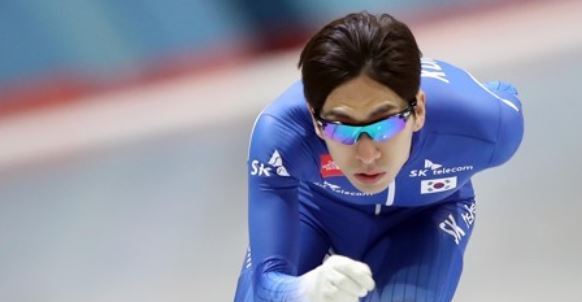Former Olympic rivals happy to be reunited as athlete, coach for Korea
By YonhapPublished : Oct. 24, 2017 - 13:34
They were once battling each other for Olympic speed skating medals, but now, Lee Seung-hoon of South Korea and Bob de Jong of the Netherlands are chasing a common goal as athlete and coach -- to win medals for host South Korea at the 2018 PyeongChang Winter Games.
Lee was the shock gold medalist in the men's 10,000m at the 2010 Vancouver Winter Games, where de Jong claimed the bronze. Turn the clock forward more than seven years, and de Jong is now the South Korean national team coach and Lee one of his skaters as they gear up for PyeongChang 2018.
"It's kind of amazing that we've ended up on the same team after competing against each other on the ice," Lee said after the national team's open practice session at Taeneung International Rink in Seoul on Tuesday. "I got to learn so much from him just by watching, and I am so happy to have him as my coach. I'll pick his brain as much as I can for the Olympics."
Lee also won silver in the 5,000m in Vancouver and added a further silver in the team pursuit four years later in Sochi. He's since turned himself into a mass start specialist and finished the 2016-2017 season as the world No. 1.
And he'll look to de Jong for a great deal of guidance. The 40-year-old Dutchman counts the 10,000m gold at the 2006 Torino Winter Games among his four Olympic medals, and he also won seven world titles in the 5,000m and 10,000m.
Lee was the shock gold medalist in the men's 10,000m at the 2010 Vancouver Winter Games, where de Jong claimed the bronze. Turn the clock forward more than seven years, and de Jong is now the South Korean national team coach and Lee one of his skaters as they gear up for PyeongChang 2018.
"It's kind of amazing that we've ended up on the same team after competing against each other on the ice," Lee said after the national team's open practice session at Taeneung International Rink in Seoul on Tuesday. "I got to learn so much from him just by watching, and I am so happy to have him as my coach. I'll pick his brain as much as I can for the Olympics."
Lee also won silver in the 5,000m in Vancouver and added a further silver in the team pursuit four years later in Sochi. He's since turned himself into a mass start specialist and finished the 2016-2017 season as the world No. 1.
And he'll look to de Jong for a great deal of guidance. The 40-year-old Dutchman counts the 10,000m gold at the 2006 Torino Winter Games among his four Olympic medals, and he also won seven world titles in the 5,000m and 10,000m.

Since taking over the national team in May, de Jong said he's been trying to stress some technical points on his new athletes.
"I have focused on gliding on straights and working more in the corners," he said. "They're fast. They don't need to spend energy on straights. (They should) save it for corners."
Lee didn't foresee any major cultural issues with de Jong, since he has worked with other foreign coaches before. De Jong, for his part, said he respects the cultural differences between the Netherlands and South Korea, and he doesn't want to force South Koreans to become like the Dutch, as dominant as the Europeans have been in speed skating.
"Many speed skaters (in South Korea) come from short track and they have good cornering techniques," de Jong said. "In the Netherlands, we're coming from long track and we bike a lot. So we get a lot of endurance. But I don't want to make Koreans like the Dutch. The cultures are different. The Koreans are good skaters."
One thing de Jong can do for South Korea is to share his knowledge of Dutch skaters with his new national team.
"We have the same goal to beat all the other skaters," de Jong said of South Korean skaters. "I can help Seung-hoon and give him information on other (Dutch) skaters. I can explain how they skate and prepare." (Yonhap)







![[KH Explains] Hyundai's full hybrid edge to pay off amid slow transition to pure EVs](http://res.heraldm.com/phpwas/restmb_idxmake.php?idx=644&simg=/content/image/2024/04/18/20240418050645_0.jpg&u=20240419100350)







![[From the Scene] Monks, Buddhists hail return of remains of Buddhas](http://res.heraldm.com/phpwas/restmb_idxmake.php?idx=652&simg=/content/image/2024/04/19/20240419050617_0.jpg&u=20240419175937)

![[KH Explains] Hyundai's full hybrid edge to pay off amid slow transition to pure EVs](http://res.heraldm.com/phpwas/restmb_idxmake.php?idx=652&simg=/content/image/2024/04/18/20240418050645_0.jpg&u=20240419100350)

![[Today’s K-pop] Illit drops debut single remix](http://res.heraldm.com/phpwas/restmb_idxmake.php?idx=642&simg=/content/image/2024/04/19/20240419050612_0.jpg&u=)